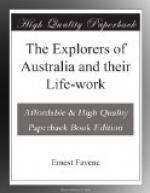CHAPTER 10. LATER EXPLORATION IN THE NORTH-EAST.
10.1. Walker in search of Burke and Wills.
Frederick Walker commenced his bush career as a pioneer squatter in the districts of Southern Queensland, but afterwards made his residence near the centre, where he joined the Native Police. He had long bush experience, was a firm believer in the training of the natives in quasi-military duty, and had taken a prominent part in the formation of the Queensland Native Police. On this relief expedition, the party was composed almost entirely of Native Police troopers under his leadership.
On receiving his commission, he pushed rapidly out to the Barcoo, and, near the Thomson River, came upon another tree marked L. This might have been made by Leichhardt. He ascended the main watershed, and crossed it coming down on to the head of the Flinders River. Here he experienced many hindrances arising from the rough basaltic nature of the country that borders the northern head-waters of that river. When he finally debouched upon the wide western plains, he crossed the Flinders, without recognising it as the main branch, in the search for which he went on northward. Approaching the Gulf of Carpentaria, he had several encounters with the aboriginals. As he neared the coast, the bend of the Flinders brought that river again across his route, and it was then that he came on some camel tracks, which assured him that the missing party, the object of his search, had at any rate reached the Gulf safely. On his outward way Walker may be said to have pursued a course parallel with that of the Flinders, a little further to the northward.
He pushed on to the Albert River, to replenish his provisions at the depot provided for the use of the various relief parties. He arrived there safely, after having had two more skirmishes with the blacks on the way. He reported the finding of the camel tracks, and having come to the conclusion that Burke and Wills had probably made for the Queensland settlements, he decided to follow them thither. He traced out a tributary of the Flinders, the Saxby, on his homeward route, but saw no more of the camel tracks, and finally crossed the water-shed on to the rough basaltic country at the head of the Burdekin. Here his horses suffered so severely from the rugged nature of the country, that by the time they reached Strathalbyn, a station on the lower Burdekin, the whole of the party were well-nigh horseless, as well as almost out of provisions.
Walker was afterwards engaged by the Queensland Government to mark out a course for a telegraph line between Rockingham Bay and the mouth of the Norman River in Carpentaria. This work he carried out successfully; but when at the Gulf, he was attacked by the prevalent malarial fever, and died there.
10.2. Burdekin and Cape York expeditions.




